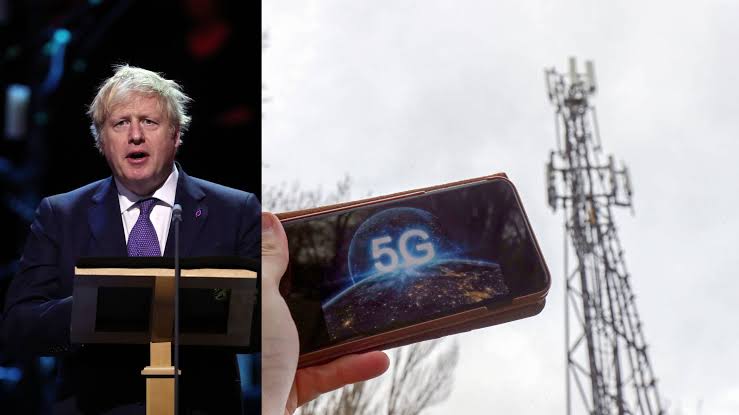Washington – The Trump administration showed disappointment on Tuesday after the U.K. decided it would allow China’s telecommunications giant Huawei limited access to specific British 5G cellular networks.
A senior Trump administration member wrote in an email to CNBC, “The United States is disappointed by the U.K.’s stance. The Trump administration will work with the U.K. on the way forward, which will result in the removal of untrusted vendor components from 5G networks.”
The U.K. said that equipment manufactured by Huawei wouldn’t be banned, but entry would be prohibited for “sensitive functions.”
Boris Johnson’s government made the decision despite cautions from President Trump, who has called Johnson a “friend.”
The latest development from the U.K. comes at a time when the Trump administration is working to isolate Chinese tech companies from generating a larger foothold in the U.S. partner countries. The administration specifically worked to hold back members of the “five eyes” intelligence-sharing group, which includes the U.S., Canada, U.K., New Zealand and Australia, from working with Huawei.
In 2018, due to potential security concerns, the Pentagon suspended the trade of Huawei and ZTE mobile phones and modems on military bases worldwide.
“We continue to ask all of our associates and allies to cautiously assess the multifaceted impact of letting untrusted vendors access to significant 5G network infrastructures,” Lt. Col. Dave Eastburn, Pentagon spokesman, wrote in a statement to CNBC.
“It’s been assessed that there’s no safe option for untrusted vendors to handle any part of a 5G network,” Eastburn added.
Long-standing U.S.-China concerns
The U.S. authorities have long complained that China’s intellectual property theft has cost the economy billions of dollars in revenue and hundreds of thousands of jobs and that it threatens national security. China, for its part, denies any engagement in intellectual property theft.
When CNBC questioned the issue on his first day as the U.S. Secretary of Defense, Mark Esper said he was “very alert about Chinese technology getting into our systems or the systems of our allies.”
“Huawei appeared as a poster child right now for that,” Esper said, adding that the U.S. trade war with China is as crucial for national security as it is for the economy.
Esper, while referring to a NATO visit he made while acting Defense Secretary, said, “When I was in Brussels three weeks ago, we discussed this among defence ministers, on how do we sustain the integrity of our networks as an alliance, and so that will continue to be important for me as we progress ahead.”
When and how did the U.K. announce China’s participation in its 5G network?
Last year, even with national security precautions, then-U.K. Prime Minister Theresa May reportedly passed a plan to allow Huawei to build part of the U.K.’s 5G network. Her decision was leaked, resulting in the dismissal of then-Defense Secretary Gavin Williamson.
Williamson has turned down allegations that he was the source of the leak.
A month earlier, Williamson’s removal, then-Chairman of the Joint Chiefs of Staff Gen. Joseph Dunford, stated that if U.S. allies carried on with Huawei’s equipment, intelligence cooperation could be undermined.
He spoke to a House Appropriations subcommittee in April 2019 that “One of the things that accentuates an alliance is the ability to share data, and when we share data with allies and partners, we have to have common standards of data assurance. We must ensure that our secrets are protected, whether it be intelligence or technology sharing.”
Interpreting Dunford’s opinions, then-acting Secretary of Defense Patrick Shanahan told lawmakers, “China aims to steal its way to a Chinese-controlled global technological infrastructure, including 5G.”
“Huawei exemplifies China’s Communist Party’s organized, systematic, and state-driven strategy to get global leadership in advanced technology.”
Moreover, the Director of National Intelligence, in conjunction with the heads of the CIA, FBI, NSA, National Geospatial-Intelligence Agency, and Defense Intelligence Agency, testified before lawmakers in 2018 on serious security risks posed by Huawei and ZTE.
“We’re extremely concerned about the risks of tolerating any company or entity that is beholden to foreign governments that don’t share our values to achieve places of power inside our telecommunications network,” said FBI Director Christopher Wray to the U.S. Senate Intelligence Committee.
“It brings the capacity to modify or steal data unlawfully. And it also brings the capacity to conduct undetected espionage,” Wray added.
Huawei denials
Huawei and ZTE have rejected allegations that their equipment is used to spy on Americans.
The U.S. government has been warning against Huawei and ZTE’s products since the beginning of 2012. The Chinese company has been facing a ban since that time, with an executive order from President Trump making those recommendations official.
“U.S. government systems shouldn’t deploy any of the equipment from Huawei or ZTE,” according to a 2012 report by the Permanent Select Committee on Intelligence. “Likewise, government contractors, precisely those working on contracts for sensitive U.S. structure, should exclude Huawei or ZTE equipment from their systems.”
As for Huawei’s so-called ties to Beijing, the company has strongly declined accusations.
The 2012 report and later intelligence briefings on Huawei do not contain specific evidence of Huawei’s ties to the Beijing government but proclaim that the risk of allowing the Chinese telecommunications giant to supply this critical equipment is too great.
Huawei representatives have expressed that they have frequently asked the Department of Defense to permit the company to submit to a risk mitigation process, but no deal has ever been made.
The 2012 report states that the task of identifying and disposing of every challenging vulnerability in a multifaceted product is monumental. And if we take into account the flaws intentionally inserted by a determined and clever insider, the task becomes virtually impossible.


